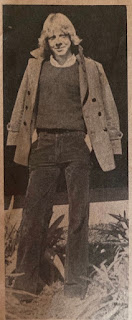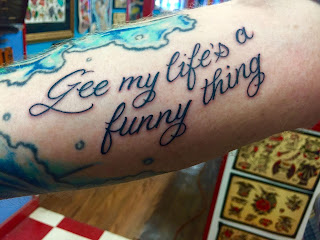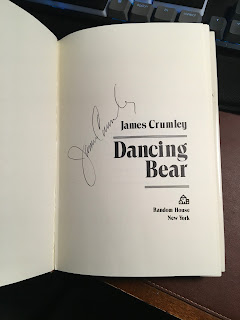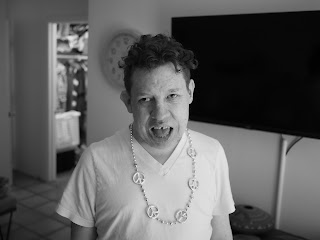"Actually, it's more of a guideline than a rule..." - Ghostbusters
 |
| Teen age me |
A: This question stirred up a lot of thoughts. First, I grew up with a certain amount of violence and criminality. I don’t want to dance around it or glorify it. My parents were social activists, non violent protesters who when pushed hard enough would get violent with us kids. My father once told me that he had me by the throat, against a wall and saw in my eyes that I couldn’t back down. He said he realized that “I had to kill you or walk away.” I’m glad he didn’t kill me.
 |
| My tattoo for when life gets rough |
As a teenager I discovered alcohol and drugs, driving too fast on country roads, and that if I let my rage build up it could be used as a weapon. I sold pot, and hash that was reported to have swirls of opium in it. I robbed multiple homes. Arrested for driving while drinking at fifteen, arrested for robbing a house when I was sixteen. I carried a Buck knife and a pistol when I was afraid enough to feel I had to. I was a lousy criminal. I felt guilty for being me. I knew criminals, looked up to some, feared others, was good friends with a few. I knew sex workers. I knew what it felt like to be surrounded by families with money when we had none. I know how it feels to be hit and how it feels to hit.
Why this very personal confession? To let you know I know some truths about crime and violence. I don’t feel I profit off tragedy as long as I share the real real. Violence isn’t an 80’s action flick, all cool lines and painless killing of thug #1 through #57. Not that I don’t dig those films, they just don’t speak to my soul.
Mean Streets and Taxi Driver both ripped my guts up in the best way. They told stories I understood and thought one day I might create myself. They were honest about the crazy pain and macho posing that preceded violence.
There were writers who convinced me I could tell my stories in books.
 |
| Steve H. Gave me this years ago |
James Crumley wrote poetically about tragically flawed drunks fighting to right wrongs and mostly failing. His violence is always ugly, never heroic.
“I have learned some things. Modern life is warfare without end: take no prisoners, leave no wounded, eat the dead--that's environmentally sound.”
― James Crumley, Dancing Bear
That line is pure hardboiled poetry, and heartbreaking when you realize it is Milo Dragovitch’s world view.
 |
Again, pure poetry that also makes me feel the pain. There were more writers but you get the point.
I never met a rule I didn’t want to break, and yet, here are my personal rules for writing crime fiction:
1) Violence hurts everyone involved. It eats away at the victim and assailant. For creatures with such a violent history we humans haven’t often dealt with it or it’s aftermath well. If I’m afraid to show all of this, I shouldn’t write about violence.
2) Poverty doesn’t equal criminality. This is a trope in crime fiction films and books. A couple driving home from a Lakers game break down and have to leave the freeway, they wind up in… da da da dum, COMPTON. Now they are in real danger. Life is cheap on mean (read poor) streets. Bullshit. Life is equally valuable to all families regardless of income bracket or zip code.
This also shows up in country noir and desert noir. Being broke doesn’t make you become a criminal, it’s more complex. Some commit crimes because they see no other way to make it financially. Some people commit crimes for the thrill. For a while there was a prison program where hard core criminals were taught deep sea welding. The job is dangerous, i.e. thrilling. They’re on a platform at sea for weeks or months at a time, that means when they get back on dry land they had a knot of cash. It fulfilled many of the same needs crime did. The recidivism rate was near zero. But it didn’t look like “tough on crime” so the program was dismantled.
2a) Drug addiction doesn’t equal criminality. Addiction is multi hued and complex, but it doesn’t make people steal. Not having access to drugs is the real problem. As a culture we believe drug addiction is a moral failing and must be punished. If we cared about our citizens we would have policies that mitigate harm to the addict and society. Clean needles, and a clean place to use them. Naloxone, a medication used to reverse overdoses of opioids should be carried by every emergency worker and be readily available and affordable to anyone who wants to have it on hand. But again that doesn’t sound tough on crime so it’s a no go. From a writing stand point, junkies are complex interesting humans. Don’t fall into the party line that they are all dangerous criminals.
3) Criminality does not equal lack of morals. Tomas C. my actual partner in crime was an honest and faithful friend. He thought violence was the last resort of weak people. He was trained in martial arts, Kung Fu if I remember right. Just fucking around I’d seen what he could do. One day a group of guys came after him and me. Called him a honkey loving beaner. Tension sizzled and sparked between them. Slipping my hand in my pocket I opened my knife, ready for what surely was about to happen. We were fourteen, high on testosterone and rag weed. The guy spit in Tomas’ face. My muscles tightened. I wanted to puke. I wanted to hurt this asshole. Without even wiping off his face Tomas tilted his head at me, turned and walked away. I followed him. Our backs were open to our enemies. A fatal move. Only it wasn’t. If this was a film, Tomas and I would have been teen thugs, criminals not even worthy of names. But Tomas had a moral code stronger than mine or any of our peers at that age.
4) Sex workers have neither hearts of gold nor are they all consumed with avarice. And I just laid down a false binary. None of us are simply A or B, we are all combinations of the entire alphabet. Every one I’ve known or interviewed was a complex interesting person. Some chose sex work because of daddy issues or trauma, others because they were parents and baby needed diapers and Cheerios. Some did it because it’s their body to do with what they want, and they chose to monetize it. For others it was a lark that turned into a job. Point is, if I wouldn’t stereotype a janitor or a car mechanic, I shouldn’t stereotype sex workers. Forgetting the humanist aspect of this, it also leads to flat boring characters.
A gang banger isn’t a character any more than a stripper is. Don’t let a simple description stand in for real character work. And if you don’t know any sex workers, meet some. Or build them based on someone you know. Just don't base any character on characters you’ve read in other crime fiction. This how we get hollow tropes and flat characters.
5) No one is only who they are on their worst day. No one is who they are on their best day either. Roll back to the Tomas almost fight story, had it gone another way, I fully believe I would have tried to stab one of the guys circling Tomas. Violence is random. I wasn’t trained to knife fight. Stab in one place, the kid gets a bandage, two inches over he gets a body bag. Unlike fiction, in real life when it comes to violence, intention and result are unrelated. So if I had killed someone that day, should that define entirely who I am? Should Tomas go through his life trying to live up to his one saintly moment. WE WERE JUST KIDS, and we were petty criminals. And we were friends. And we went to Market Street in San Fransisco to buy our first pairs of platform shoes and Super Fly hats. And before going into high school we sat in his brother’s car smoking dope and listening to Richard Pryor on the 8-track. Our high school was scary. Pot and Pryor helped us at least start the day feeling cool.
I have lived a multiverse of lives, some of them overlapping in confusing ways. I started writing about a deeply pained suicidal bouncer at a time I was in a lot of pain and as a dad and husband. I was running out of safe places to stuff it. I hoped to turn that pain into something of value. I wrote TRICKY because of what happened, and almost happened to our intellectually disabled son. I hoped by writing about it I could turn it into something of value to myself and others. Hoped I could get one person to see my son and his community as richly diverse humans, not targets to be feared. If I can help deconstruct our simplistic puritanical views of our fellow riders on this bus called life by writing crime fiction, then I can honestly say, “Fuck it, I’m okay with profiting from the tragedy of myself and others.”


8 comments:
Oh my GOD - I could not love this any more if it came with a basket of kittens. I owe you a big hug, Josh, Cx
Great post, Josh. The only thing that would make it any better … I can't get that basket of kittens out of my head.
I forgot to mention, this post comes with a basket of kittens!
And thank you both!
Brilliant, brilliant, brilliant, Josh. As I see it, you're not profiting from crime in your writing, you're giving the world new ways of looking at what can too easily be dismissed without understanding. Readers profit by engaging with the nuanced characters you write about - and the nuanced person you are! Hugs to you and to Erika, who obviously saw through the tropes early on.
Susan, thank you for making my day. Erika has said more than once, if she’d met teen Josh, she’d have run for the hills.
Hey Josh,
I doubt that Erika would. I met teen Josh and considered him my friend. Great read and perspective.
Louise
Bro, I don’t write, don’t plan too, however this just plain good advise for being human. Thank you.
Hmm. You left some of that stuff out of All the Wild Children.
Post a Comment